小升初英语--一般将来时
- 格式:ppt
- 大小:3.40 MB
- 文档页数:35
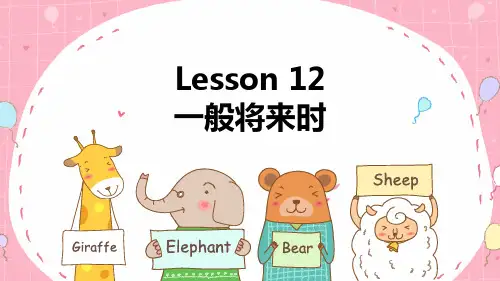
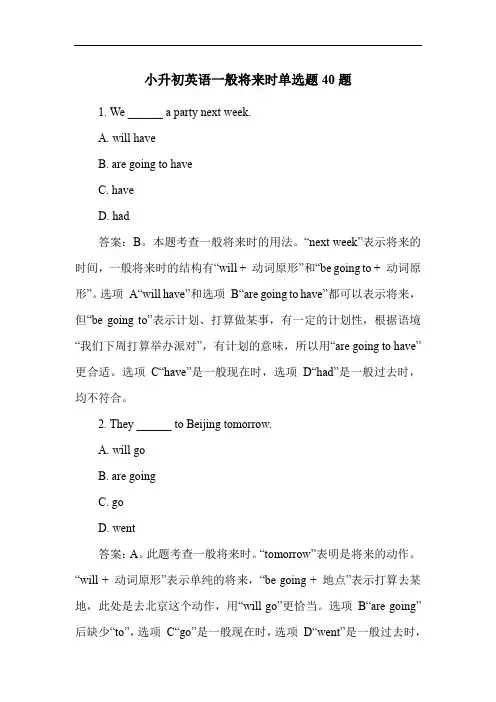
小升初英语一般将来时单选题40题1. We ______ a party next week.A. will haveB. are going to haveC. haveD. had答案:B。
本题考查一般将来时的用法。
“next week”表示将来的时间,一般将来时的结构有“will + 动词原形”和“be going to + 动词原形”。
选项A“will have”和选项B“are going to have”都可以表示将来,但“be going to”表示计划、打算做某事,有一定的计划性,根据语境“我们下周打算举办派对”,有计划的意味,所以用“are going to have”更合适。
选项C“have”是一般现在时,选项D“had”是一般过去时,均不符合。
2. They ______ to Beijing tomorrow.A. will goB. are goingC. goD. went答案:A。
此题考查一般将来时。
“tomorrow”表明是将来的动作。
“will + 动词原形”表示单纯的将来,“be going + 地点”表示打算去某地,此处是去北京这个动作,用“will go”更恰当。
选项B“are going”后缺少“to”,选项C“go”是一般现在时,选项D“went”是一般过去时,均不符合。
3. My sister ______ a new dress this weekend.A. will buyB. is going to buyC. buysD. bought答案:B。
“this weekend”提示用一般将来时。
“will + 动词原形”和“be going to + 动词原形”都能表达将来,“be going to”更强调根据现有迹象和打算做某事,这里根据语境姐姐有买新裙子的打算,所以用“is going to buy”。
选项C“buys”是一般现在时,选项D“bought”是一般过去时,均不符合。
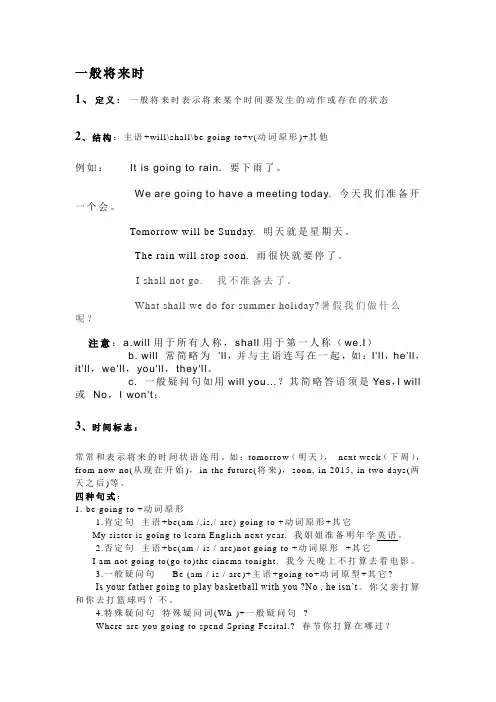
一般将来时1、定义:一般将来时表示将来某个时间要发生的动作或存在的状态2、结构:主语+will\shall\be going to+v(动词原形)+其他例如:It is going to rain. 要下雨了。
We are going to have a meeting today. 今天我们准备开一个会。
Tomorrow will be Sunday. 明天就是星期天。
The rain will stop soon. 雨很快就要停了。
I shall not go. 我不准备去了。
What shall we do for summer holiday?暑假我们做什么呢?注意:a.will用于所有人称,shall用于第一人称(we.I)b. will 常简略为'll,并与主语连写在一起,如:I'll,he'll,it'll,we'll,you'll,they'll。
c. 一般疑问句如用will you…?其简略答语须是Yes,I will 或No,I won't;3、时间标志:常常和表示将来的时间状语连用。
如:tomorrow(明天),next week(下周),from now no(从现在开始),in the future(将来),soon, in 2015, in two days(两天之后)等。
四种句式:1. be going to +动词原形1.肯定句主语+be(am /,is,/ are) going to +动词原形+其它My sister is going to learn English n ext year. 我姐姐准备明年学英语。
2.否定句主语+be(am / is / are)not going to +动词原形+其它I am not going to(go to)the cinema tonight. 我今天晚上不打算去看电影。
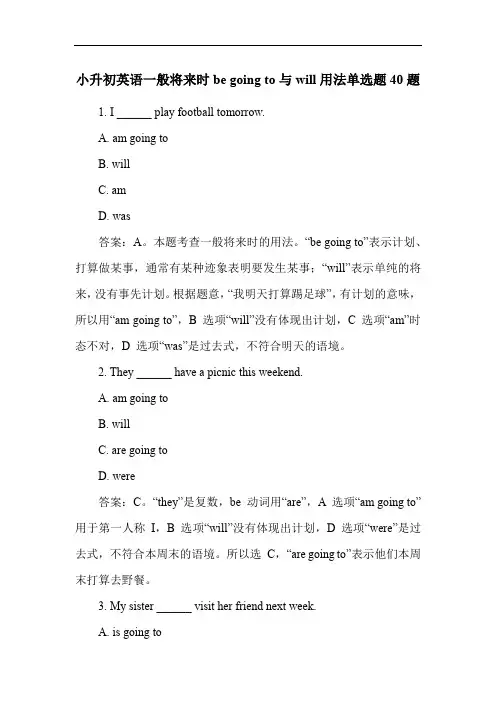
小升初英语一般将来时be going to与will用法单选题40题1. I ______ play football tomorrow.A. am going toB. willC. amD. was答案:A。
本题考查一般将来时的用法。
“be going to”表示计划、打算做某事,通常有某种迹象表明要发生某事;“will”表示单纯的将来,没有事先计划。
根据题意,“我明天打算踢足球”,有计划的意味,所以用“am going to”,B 选项“will”没有体现出计划,C 选项“am”时态不对,D 选项“was”是过去式,不符合明天的语境。
2. They ______ have a picnic this weekend.A. am going toB. willC. are going toD. were答案:C。
“they”是复数,be 动词用“are”,A 选项“am going to”用于第一人称I,B 选项“will”没有体现出计划,D 选项“were”是过去式,不符合本周末的语境。
所以选C,“are going to”表示他们本周末打算去野餐。
3. My sister ______ visit her friend next week.A. is going toB. willC. was going toD. is答案:A。
“next week”表明是将来的时间,“my sister”是第三人称单数,用“is going to”,B 选项“will”没有体现出计划,C 选项“was going to”是过去将来时,不符合,D 选项“is”时态不对。
所以选A,意思是我姐姐下周打算拜访她的朋友。
4. We ______ see a film tonight.A. are going toB. willC. wereD. are答案:B。
“tonight”今晚,A 选项“are going to”表示有计划,此处没有强调计划,用“will”更合适,C 选项“were”是过去式,D 选项“are”时态不对。
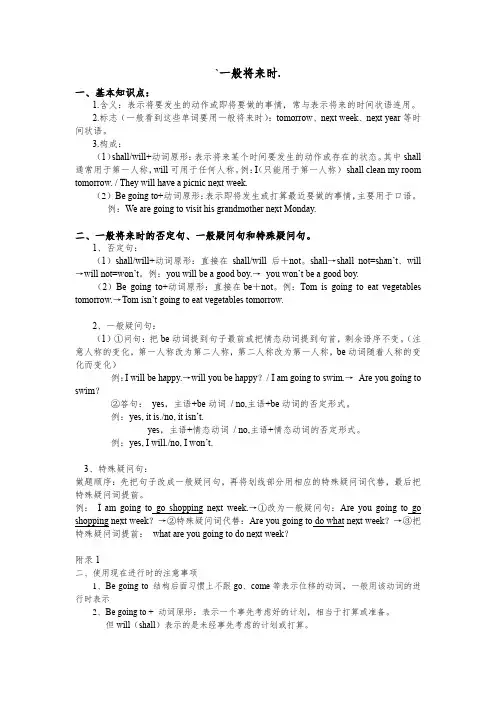
`一般将来时.一、基本知识点:1.含义:表示将要发生的动作或即将要做的事情,常与表示将来的时间状语连用。
2.标志(一般看到这些单词要用一般将来时):tomorrow、next week、next year等时间状语。
3.构成:(1)shall/will+动词原形:表示将来某个时间要发生的动作或存在的状态。
其中shall 通常用于第一人称,will可用于任何人称。
例:I(只能用于第一人称)shall clean my room tomorrow. / They will have a picnic next week.(2)Be going to+动词原形:表示即将发生或打算最近要做的事情,主要用于口语。
例:We are going to visit his grandmother next Monday.二、一般将来时的否定句、一般疑问句和特殊疑问句。
1、否定句:(1)shall/will+动词原形:直接在shall/will后+not。
shall→shall not=shan’t、will →will not=won’t。
例:you will be a good boy.→you won’t be a good boy.(2)Be going to+动词原形:直接在be+not。
例:Tom is going to eat vegetables tomorrow.→Tom isn’t going to eat vegetables tomorrow.2、一般疑问句:(1)①问句:把be动词提到句子最前或把情态动词提到句首,剩余语序不变。
(注意人称的变化,第一人称改为第二人称,第二人称改为第一人称,be动词随着人称的变化而变化)例:I will be happy.→will you be happy?/ I am going to swim.→Are you going to swim?②答句:yes,主语+be动词/ no,主语+be动词的否定形式。
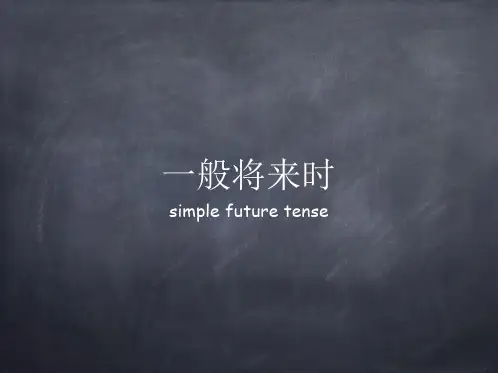
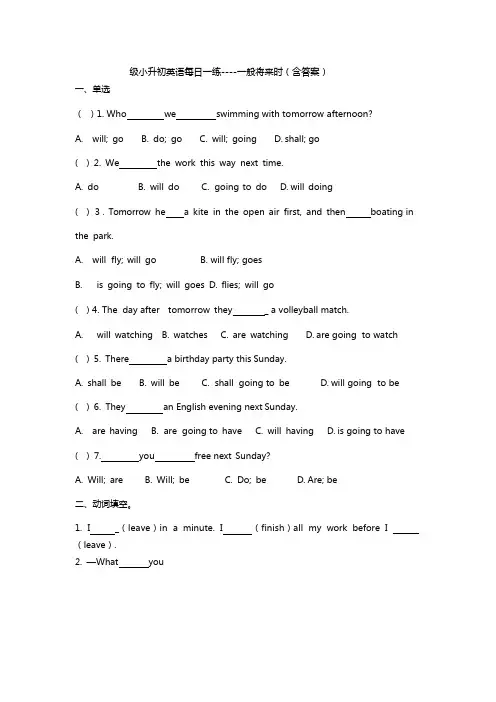
级小升初英语每日一练----一般将来时(含答案)一、单选()1. Who we swimming with tomorrow afternoon?A. will; goB. do; goC. will; goingD. shall; go( ) 2. We the work this way next time.A. doB. will doC. going to doD. will doing( ) 3 . Tomorrow he a kite in the open air first, and then boating in the park.A.will fly; will goB. will fly; goesB.is going to fly; will goes D. flies; will go( ) 4. The day after tomorrow they _ a volleyball match.A. will watchingB. watchesC. are watchingD. are going to watch ( ) 5. There a birthday party this Sunday.A. shall beB. will beC. shall going to beD. will going to be ( ) 6. They an English evening next Sunday.A. are havingB. are going to haveC. will havingD. is going to have ( ) 7. you free next Sunday?A.Will; areB. Will; beC. Do; beD. Are; be二、动词填空。
1.I _(leave)in a minute. I (finish)all my work before I (leave).2.—What you(do)after you(leave)here?—I(return)home and _(get)a job.3.I _(be)tired. I _(go)to bed early tonight.4.—you (be)here this Saturday? —No. I _(visit)my teacher.5.—_ I _(get)you a copy of today’s newspaper? —Thank you.6.Most of us don’t think their team (win).参考答案:1. D2. B3. A4. D5. B6. B7.B二、1. am leaving ; will finish ; leave 2. will ; do ; leave ; will return ; get。
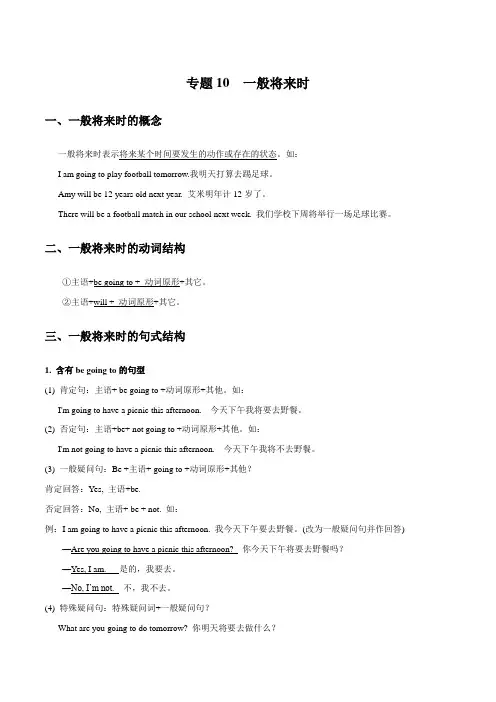
专题10 一般将来时一、一般将来时的概念一般将来时表示将来某个时间要发生的动作或存在的状态。
如:I am going to play football tomorrow.我明天打算去踢足球。
Amy will be 12 years old next year. 艾米明年计12岁了。
There will be a football match in our school next week. 我们学校下周将举行一场足球比赛。
二、一般将来时的动词结构①主语+be going to + 动词原形+其它。
②主语+will + 动词原形+其它。
三、一般将来时的句式结构1. 含有be going to的句型(1) 肯定句:主语+ be going to +动词原形+其他。
如:I'm going to have a picnic this afternoon. 今天下午我将要去野餐。
(2) 否定句:主语+be+ not going to +动词原形+其他。
如:I'm not going to have a picnic this afternoon. 今天下午我将不去野餐。
(3) 一般疑问句:Be +主语+ going to +动词原形+其他?肯定回答:Yes, 主语+be.否定回答:No, 主语+ be + not. 如:例:I am going to have a picnic this afternoon. 我今天下午要去野餐。
(改为一般疑问句并作回答) —Are you going to have a picnic this afternoon? 你今天下午将要去野餐吗?—Yes, I am. 是的,我要去。
—No, I’m not. 不,我不去。
(4) 特殊疑问句:特殊疑问词+一般疑问句?What are you going to do tomorrow? 你明天将要去做什么?例:Sam is going to have a birthday party this Friday. 山姆这周五将有一个生日派对。
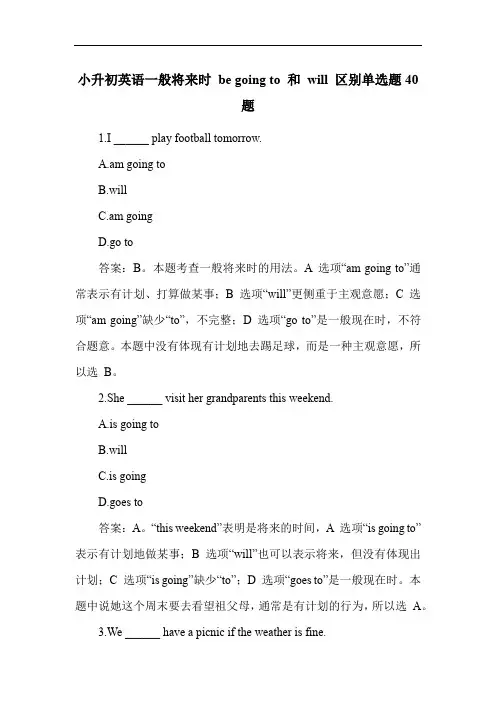
小升初英语一般将来时be going to 和will 区别单选题40题1.I ______ play football tomorrow.A.am going toB.willC.am goingD.go to答案:B。
本题考查一般将来时的用法。
A 选项“am going to”通常表示有计划、打算做某事;B 选项“will”更侧重于主观意愿;C 选项“am going”缺少“to”,不完整;D 选项“go to”是一般现在时,不符合题意。
本题中没有体现有计划地去踢足球,而是一种主观意愿,所以选B。
2.She ______ visit her grandparents this weekend.A.is going toB.willC.is goingD.goes to答案:A。
“this weekend”表明是将来的时间,A 选项“is going to”表示有计划地做某事;B 选项“will”也可以表示将来,但没有体现出计划;C 选项“is going”缺少“to”;D 选项“goes to”是一般现在时。
本题中说她这个周末要去看望祖父母,通常是有计划的行为,所以选A。
3.We ______ have a picnic if the weather is fine.A.are going toB.willC.are goingD.go to答案:B。
本题中如果天气好我们去野餐,这更多是一种主观意愿,不是有明确计划的行为,所以用“will”更合适。
A 选项“are going to”一般表示有计划;C 选项“are going”缺少“to”;D 选项“go to”是一般现在时。
所以选B。
4.He ______ buy a new book after school.A.is going toB.willC.is goingD.goes to答案:A。
放学后买新书通常是有一定计划的行为,所以用“is going to”更合适。
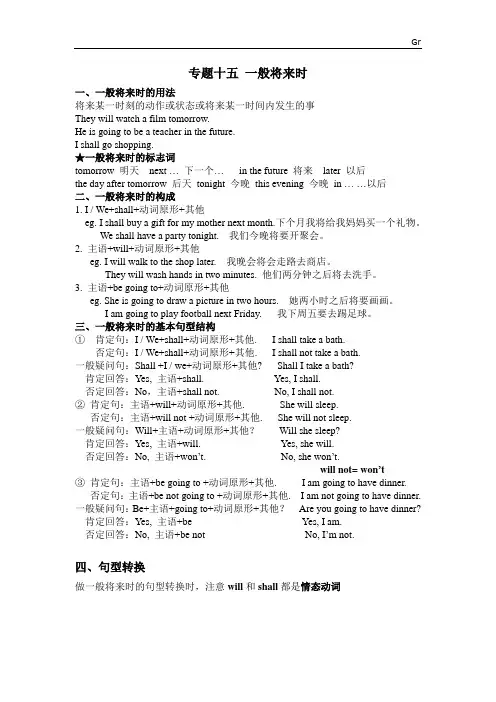
专题十五一般将来时一、一般将来时的用法将来某一时刻的动作或状态或将来某一时间内发生的事They will watch a film tomorrow.He is going to be a teacher in the future.I shall go shopping.★一般将来时的标志词tomorrow 明天next …下一个…in the future 将来later 以后the day after tomorrow 后天tonight 今晚this evening 今晚in ……以后二、一般将来时的构成1. I / We+shall+动词原形+其他eg. I shall buy a gift for my mother next month.下个月我将给我妈妈买一个礼物。
We shall have a party tonight. 我们今晚将要开聚会。
2. 主语+will+动词原形+其他eg. I will walk to the shop later. 我晚会将会走路去商店。
They will wash hands in two minutes. 他们两分钟之后将去洗手。
3. 主语+be going to+动词原形+其他eg. She is going to draw a picture in two hours. 她两小时之后将要画画。
I am going to play football next Friday. 我下周五要去踢足球。
三、一般将来时的基本句型结构①肯定句:I / We+shall+动词原形+其他. I shall take a bath.否定句:I / We+shall+动词原形+其他. I shall not take a bath.一般疑问句:Shall +I / we+动词原形+其他? Shall I take a bath?肯定回答:Yes, 主语+shall. Yes, I shall.否定回答:No,主语+shall not. No, I shall not.②肯定句:主语+will+动词原形+其他. She will sleep.否定句:主语+will not +动词原形+其他. She will not sleep.一般疑问句:Will+主语+动词原形+其他?Will she sleep?肯定回答:Yes, 主语+will. Yes, she will.否定回答:No, 主语+won’t. No, she won’t.will not= won’t③肯定句:主语+be going to +动词原形+其他. I am going to have dinner.否定句:主语+be not going to +动词原形+其他. I am not going to have dinner. 一般疑问句:Be+主语+going to+动词原形+其他?Are you going to have dinner? 肯定回答:Yes, 主语+be Yes, I am.否定回答:No, 主语+be not No, I’m not.四、句型转换做一般将来时的句型转换时,注意will和shall都是情态动词含有情态动词的句型转换做题步骤:①变否定句a. 找出情态动词注意:some变anyb. 情态动词后加not扩展:can not = can’t should not = shouldn’t②变一般疑问句a. 找出情态动词注意:一二人称互换b. 情态动词提前,其余照抄some变anyc. 句末加问号。
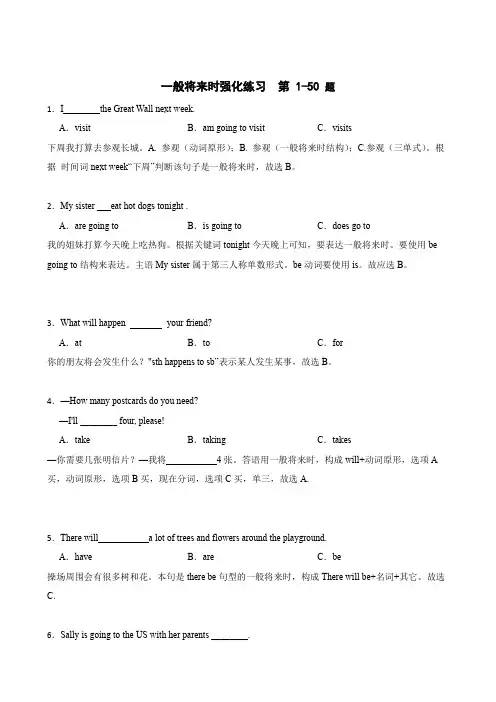
一般将来时强化练习第 1-50 题1.I the Great Wall next week.A.visit B.am going to visit C.visits下周我打算去参观长城。
A. 参观(动词原形);B. 参观(一般将来时结构);C.参观(三单式)。
根据时间词next week“下周”判断该句子是一般将来时,故选B。
2.My sister ___eat hot dogs tonight .A.are going to B.is going to C.does go to我的姐妹打算今天晚上吃热狗。
根据关键词tonight今天晚上可知,要表达一般将来时。
要使用be going to结构来表达。
主语My sister属于第三人称单数形式。
be动词要使用is。
故应选B。
3.What will happen your friend?A.at B.to C.for你的朋友将会发生什么?"sth happens to sb”表示某人发生某事,故选B。
4.—How many postcards do you need?—I'll ________ four, please!A.take B.taking C.takes—你需要几张明信片?—我将4张。
答语用一般将来时,构成will+动词原形,选项A 买,动词原形,选项B买,现在分词,选项C买,单三,故选A.5.There will a lot of trees and flowers around the playground.A.have B.are C.be操场周围会有很多树和花。
本句是there be句型的一般将来时,构成There will be+名词+其它。
故选C.6.Sally is going to the US with her parents ________.A.next summer holiday B.last winter莎莉要和父母一起去美国。
第二讲一般将来时一般将来时通常表示现在还没有发生,但将要发生的事情或动作如:It is going to rai n.要下雨了。
We are going to have a meeti ng today.今天我们准备开一个会。
Tomorrow will be Sun day.明天就是星期天。
I shall not go.我不准备去了。
What shall we do for summer holiday? 暑假我们做什么呢?语法精讲第一人称(I /we)+shall +动词原形I shall be there in five mi nutes.我五分钟后会到那里。
_________________________________________ 我们今晚去哪里?We shall probably go to Xi 'n for our holiday.我们很可能去西安度假。
2各人称单复数+ will +动词原形When will we know our test scores?我们什么时候能知道测验的分数?_______________________________________ 他明天要和他爸爸去钓鱼You will get sick if you eat too much.如果吃得太多了,你会生病的。
一般将来时的基本用法. __________________________________ /一般将来时常常和表示将来的时间状语连用。
如:tomorrow (明天),next week(下周),from now no(从现在开始),in the future(将来),soon, in 2015, in two days两天之后)等。
be going to+ do①第一人称单数(I)+ am going to + v (动词原形)+其他成分我打算今天下午去打篮球。
②第二人称单数(you)/各人称复数(we/you/they)+going to + v (动词原形)+其他成分You are going to have a pic nic with me tomorrow. 我们打算下午去爬山。
小升初语法必刷题—一般将来时一、用所给词的正确形式填空。
1.It______ (rain )tomorrow, because it's windy and cloudy today.2.Mike is going to ______(play )basketball.3.My sister______ (go )to Shanghai next week.4.Jimmy______ ( buy ) some books in the bookstore on the weekend.5.Miss Wang ______( give ) me a gift on my next birthday.6.We will______ ( go ) for a picnic tomorrow.7.I ______( write ) a letter to my pen pal later.8.Who ______you ______( want ) to meet this evening?9.Lily ______( stay ) with me tonight.10.Mike is going to______(play)basketball.11.I______(see)a film with my best friend next Sunday.12.Mr. Read is a______(visit). He is going to______(visit)China next month.二、单项选择1.Please be quick! Mr Wang______ for you outside.A. waitsB. is waitingC. will waitD. waited2.It's nine ten. The students______ a music class.A.haveB. havingC. is havingD. are having3.What______ you going to do tomorrow morning?A.isB.amC.areD.be4.He ______in three days.A. coming backB. came backC. will come backD. is going to coming back5.Mother______ me a nice present on my next birthday.A.will givesB. will giveC. givesD. give6.I ______going to______ shopping.A.am;goB. was;goingC. am;goingD.are;go7.We______ 12 next year.A.want toB.areC.willD.will be8.一Where ________your brother go tomorrow?—He will go to my uncle's house.A. didB. doesC. willD. do9.What are you________ tomorrow afternoon?A.going to doB.doC.go to doD.going to doing10.When________you________ reading Jane Eyre?—It’s hard to say. I'm busy recently.A. did;finishB. have;finishedC. will;finishD. do;finish三、按要求改写句子。
小升初英语一般将来时be going to与will用法完形填空题20题答案解析版1This weekend is going to be great! I am so excited. My family and I are going to have a picnic in the park. We are going to take a lot of delicious food. My brother is going to fly a kite. I am going to read my favorite book under a tree. After that, we are going to go for a walk around the lake.1. I ___ read my favorite book under a tree.A. am going toB. willC. was going toD. am答案:A。
“be going to”表示计划、打算做某事,符合语境。
B 选项“will”也可表示将来,但此处强调计划,“be going to”更合适;C 选项“was going to”是过去将来时,不符合;D 选项“am”缺少动词原形,不能表示将来。
2. My brother ___ fly a kite.A. is going toB. willC. was going toD. is答案:A。
理由同上,强调计划做某事用“be going to”。
B 选项“will”在此处不如“be going to”更能体现计划性;C 选项是过去将来时错误;D 选项“is”缺少动词原形,不能表示将来。
3. We ___ take a lot of delicious food.A. am going toB. willC. are going toD. be答案:C。
“we”是复数主语,“be going to”结构中be 动词用are。
小升初英语一般将来时单选题80题1. I think I ______ a doctor when I grow up.A. will beB. amC. wasD. is答案:A。
本题考查一般将来时,“when I grow up”表示将来的时间,所以要用will + 动词原形,A 选项“will be”符合,B 选项“am”是一般现在时,C 选项“was”是一般过去时,D 选项“is”是一般现在时的第三人称单数形式,均不符合将来的语境。
2. We ______ a picnic this weekend.A. will haveB. haveC. hadD. has答案:A。
“this weekend”表示将来的时间,一般将来时用will + 动词原形,“have a picnic”是固定短语,A 选项“will have”符合,B 选项“have”是一般现在时,C 选项“had”是一般过去时,D 选项“has”是一般现在时的第三人称单数形式,都不符合本题的将来时态。
3. My sister ______ to Beijing next month.A. goesB. will goC. wentD. going答案:B。
“next month”是将来的时间,要用一般将来时,will + 动词原形,B 选项“will go”符合,A 选项“goes”是一般现在时,C 选项“went”是一般过去时,D 选项“going”不能单独作谓语,需要与be 动词连用构成进行时。
4. They ______ a new house next year.A. buildB. will buildC. builtD. builds答案:B。
“next year”表示将来的时间,一般将来时结构will + 动词原形,B 选项“will build”正确,A 选项“build”是一般现在时,C 选项“built”是一般过去时,D 选项“builds”是一般现在时的第三人称单数形式,都不符合将来的语境。
小升初英语一般将来时will 和shall 区别单选题40题1.I ____ play football tomorrow.A.willB.shallC.canD.may答案:A。
本题中,“tomorrow”表明是将来的时间,“will”和“shall”都可以表示将来,但在一般情况下,“will”用于所有人称,而“shall”通常只用于第一人称(I 和we),且用于比较正式的场合或提出建议。
这里是一般的陈述句,用“will”更合适。
“can”表示能力,“may”表示可能,不符合题意。
2.We ____ go to the park this weekend.A.willB.shallC.mustD.should答案:A。
“this weekend”是将来的时间,“will”和“shall”都可表将来,对于“We”,“will”更常用。
“must”表示必须,“should”表示应该,与将来时间不对应。
3.My brother ____ visit me next month.A.willB.shallC.wouldD.should答案:A。
“next month”是将来时间,“will”用于所有人称表将来,“shall”一般不用于第三人称。
“would”是“will”的过去式,“should”表示应该,不符合语境。
4.I ____ help you with your homework after school.A.willB.shallC.mustD.can答案:A。
“after school”是将来的时间,“will”表将来,“shall”不用于此语境。
“must”必须,“can”能,不符合帮助做作业的语境。
5.She ____ come to the party if she has time.A.willB.shallC.mustD.should答案:A。
“if she has time”表明是将来的情况,“will”表将来,“shall”不用于第三人称。